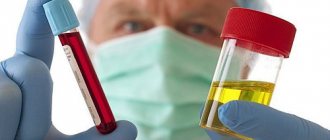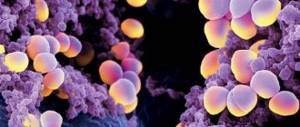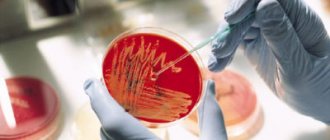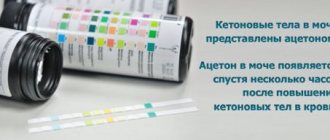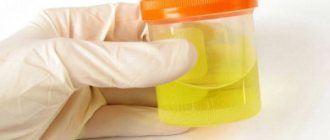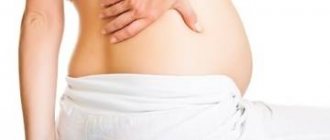The main source of energy in the human body is glucose. When it is deficient, proteins and fats are actively used to maintain energy balance. As a result of the breakdown of the latter, metabolic by-products are formed in excess quantities - acetone, acetoacetic and beta-hydroxybutyric acids. They are called ketone bodies.
In a healthy person, a small amount of ketones is present in the blood (1-2 mg for every 100 ml of plasma); normally, about 10-50 mg are excreted in the urine per day. This value is so insignificant that it is not detected by routine laboratory methods.
A slight excess of the daily norm of ketone bodies in urine during pregnancy is not dangerous, but high values (2-4 crosses) are a definite signal and require an urgent search for the cause.
Ketone bodies during pregnancy: normal
During normal functioning of the body, ketone bodies should not be detected in the urine during pregnancy. In general, approximately 20-50 milligrams of ketone bodies are released per day. This volume must be fully processed and broken down along with other decomposition products.
However, it is worth noting that traces of ketone bodies in urine during pregnancy do not always indicate abnormalities. For example, as a rule, acetone bodies are often found at 17 weeks of pregnancy. A slight increase in ketones in urine during pregnancy may indicate that the body simply does not have time to adapt to a sharp increase in loads.
The reason for concern should be a sharp jump in acetone bodies in the urine, while the woman herself will feel an increase in ketones. For example, if ketone bodies increase to 6 mmol l during pregnancy, then the expectant mother will most likely feel weak, tired, headache or dizzy. Symptoms may also include nausea and vomiting. A sharp and significant increase in ketone bodies in the urine during pregnancy may indicate:
- about the presence of decompensated diabetes mellitus;
- about infectious processes in the body;
- about an increase in corticosteroids;
- about poor nutrition (eating large amounts of fats and carbohydrates and small amounts of proteins) or fasting;
- about thyrotoxicosis;
- about Gierke's disease or coma;
- about hormonal imbalances;
- about fever;
- about poisoning;
- about cancer.
Causes of Increased Ketones
Ketones may appear in the urine of an expectant mother due to malnutrition. Therefore, if your diet is dominated by protein and fatty foods, and there is also a persistent deficiency of complex carbohydrates, you should not be surprised by the results of the analysis.
Acetone bodies may also predominate in urine due to dehydration due to prolonged vomiting. This is especially true for those women who suffer from severe manifestations of toxicosis.
Other reasons for increasing the concentration of ketones in urine:
- Long-term consumption of foods enriched with ketogenic substances;
- Following a low-carbohydrate diet (or a minimum amount of carbohydrate-containing foods in the usual diet);
- Alcohol intoxication;
- The presence of slightly alkaline food products in a woman’s usual menu;
- Chemical poisoning (such as lead or mercury);
- Fever;
- Diabetes;
- Some infectious pathologies (tuberculosis, influenza, scarlet fever, etc.);
- Excessive psycho-emotional stress, nervous tension, increased excitability.
Among the more dangerous, but less common causes of ketonuria during pregnancy, the following factors should be highlighted:
- Oncological processes;
- Severe liver pathologies;
- Serious hormonal disorders that can lead to miscarriage or miscarriage at any stage.
Ketone bodies in urine during pregnancy: how to detect
To detect ketone bodies in urine during pregnancy, it is enough to submit urine for a general urine test. If the concentration of ketones is increased (more than 1.5 mmol l), you may also be prescribed the following tests:
- general blood analysis;
- blood test for the concentration of ketone bodies;
- blood chemistry;
- glucose tolerance test;
- Ultrasound of the thyroid gland, liver and other internal organs.
In addition, in case of ketonuria in pregnant women, a consultation with an endocrinologist is required to clarify the specific causes of acetone and prescribe adequate treatment.
How to determine the level of ketone bodies at home
Traces of ketone bodies in urine during pregnancy can be detected independently at home. To do this, you need to purchase a special test strip or test tablet from the pharmacy to detect ketones.
How to diagnose ketone bodies using a test strip.
- Wash with a mild intimate hygiene product.
- Collect your morning urine sample in a sterile container.
- Remove the test strip from the package.
- Immerse the test strip in urine to the indicated level.
- After 2-3 seconds, take out the test strip.
- After 20 seconds, evaluate the result: if the color of the test is deep yellow, then there are no ketone bodies in the urine. If the color is darker, even dark purple, then ketones are present in the urine in different concentrations, depending on the color of the strip.
How to test urine ketone levels using a test tablet.
- Collect your morning urine sample.
- Remove the test tablet from the package.
- Place the test tablet on a clean white sheet of paper.
- Drop 1-2 drops of urine into the indicated area on the test tablet.
- After 30 minutes, evaluate the result of the test tablet by comparing its color with the standard scale included in the kit.
Increase in ketone bodies in later stages
In late pregnancy, it rarely appears in the urine. Typically, this phenomenon is observed when late toxicosis occurs, which occurs in approximately 15% of pregnant women . Usually, to eliminate a high concentration of ketones, it is enough to eliminate gestosis itself. For this, doctors usually prescribe standard or intensive therapy using special medications.
Late gestosis usually occurs due to genetic predispositions, absence of changes in the uterus and insufficient nutrition, as well as problems with the functioning of the endocrine system.
What to do if ketone bodies in urine are increased during pregnancy
If there is an increase in ketone bodies in the urine, you should urgently consult a doctor. If there is a significant and sudden increase in ketones, you may be recommended to undergo inpatient treatment, which includes drug intervention. In particular, a drip is often prescribed through which vitamin complexes and glucose are supplied. This treatment is especially necessary if the woman herself feels unwell:
- feels unwell;
- there is weight loss;
- there is a feeling of constant fatigue;
- the patient has a headache or dizziness;
- the woman constantly feels sick and vomits.
For ketonuria, I also always prescribe a diet, the adherence to which directly determines the success of treatment. If ketone bodies increase during pregnancy:
- Meat can only be consumed boiled or baked. It is allowed to eat rabbit, beef and turkey;
- light vegetable soups and low-fat fish are allowed;
- you can eat porridge;
- Quince is recommended for consumption;
- Sweets, spices, canned food, pickles, smoked meats, fatty meats, broths, fried foods, bananas, and citrus fruits are prohibited.
Also, if there is an increase in ketone bodies in the urine, it is recommended to drink juices, fruit drinks and compotes. Systematic fluid intake and restoration of electrolyte balance speeds up the healing process.
Ketone bodies in urine during pregnancy. Video
During pregnancy, hormonal and physiological changes occur in the body of the fair sex. Their body is preparing for constant stress, all organs work at an accelerated rhythm. All healthy people should not have acetone (acetone and ketone bodies) in their urine. Acetone in urine during pregnancy is not always an indicator of pathological changes. At the initial stage, its detection indicates that the woman’s body is not yet fully ready to bear a fetus, and changes are in full swing.
Reasons for the appearance of acetone in urine during pregnancy
In the early stages
If the body's glucose level is below normal, it begins to actively burn existing reserves of subcutaneous fat to make up for its deficiency. Ketones in the urine appear when the amount of sugar in the blood still does not normalize, despite all the efforts of the body. Normally, they should be no more than 2 mg per 100 ml. Ketonuria (acetonuria) is an increase in the level of ketone bodies in the urine.
Causes:
In the later stages
In the third trimester, the occurrence of acetonuria very often indicates the appearance of negative changes that are dangerous for the mother and baby.
Gestosis is a condition of the body accompanied by a number of negative changes. Firstly, the functioning of the kidneys is impaired. Secondly, blood pressure increases. Thirdly, the body begins to swell. All these deviations are very dangerous to life and health, so emergency hospitalization is necessary. Most often, this pathology affects women who were diagnosed with hypertension, kidney disease or diabetes before conception. In advanced cases of this disease, early delivery is performed. However, gestosis mainly appears in the last weeks of pregnancy, and if timely treatment was carried out, then children are born completely healthy.
Gestational diabetes mellitus is a disease in which the amount of sugar in the blood increases significantly in pregnant women. It is completely asymptomatic, so many women learn about it only from the results of a blood test. Patients with this diagnosis need to constantly monitor their sugar levels and adhere to a strict diet. After childbirth, this type of diabetes goes away on its own, but there is a high probability that the disease will reappear during a second pregnancy. Eating large amounts of fatty, salty and smoked foods. During pregnancy, you need to control your diet, because excessive weight gain greatly aggravates the general condition of the body and can complicate the birth process. Also, the abuse of these products negatively affects the functioning of the kidneys and gastrointestinal tract, which do double duty at this period of a woman’s life.
Exacerbation of chronic diseases. If a girl has similar diseases in her body, then she needs to undergo a course of treatment while planning pregnancy. This will reduce the likelihood of relapse. It can occur at any stage and cause various pathological changes in the newborn and even lead to death.
Anemia is a decrease in the level of hemoglobin in the blood due to a decrease in the number of red blood cells. Their main function is to transport oxygen to all organs and tissues of the human body. If there are few of them, then oxygen starvation occurs.
The normal blood sugar level when taken from a finger is 3.3–5.5 mmol/l. The amount of ketone bodies in the urine increases with any change in this indicator. The main symptoms of acetonuria:
Dizziness
- smell of acetone from the mouth;
- increased sweating;
- frequent migraines;
- constant desire to drink;
- lethargy, loss of strength.
Is it dangerous
A slight increase in the level of acetone in the urine for a short period of time will not cause any harm to the baby, so expectant mothers with early toxicosis have nothing to fear. But its long-term presence in the body in large quantities has a detrimental effect on the development of the fetus, because it is toxic to the baby’s brain cells, and can also trigger placental insufficiency.
The greatest danger in this case is the disease that caused its increase. It needs to be determined first. If you do not solve the problem that has arisen, several complications may arise:
- poisoning of a woman and fetus with ketone bodies;
- premature birth, miscarriage;
- dehydration;
- coma.
What is acetonuria and how does it manifest?
Acetonuria is an increase in the amount of acetone in the urine to a level where it can be detected by laboratory analysis. Sometimes its concentration increases so much that the presence of acetone in urine can be determined even by its characteristic odor (it is familiar to all women: this substance is part of nail polish remover). The acetone smell can even come from the human body, from his mouth.
During pregnancy, acetonuria can be asymptomatic, but is often accompanied by severe weakness, mental depression, and increased irritability.
These signs are generally characteristic of the early stages of pregnancy, but with a noticeable deterioration in health, they can lead to suspicion of acetonuria.
Other symptoms that appear when ketones in the blood and urine increase (vomiting, fever, swelling, etc.) depend on the diseases and pathological conditions that caused the disorder.
Interesting! Glucose tolerance test during pregnancy
Drug treatment
To get rid of ketone bodies in urine, you must first determine the main reason for their appearance. If this is gestosis, then for treatment doctors use:
- Valerian, Motherwort;
- drugs that improve uteroplacental circulation;
- drugs that lower blood pressure.
In addition, the pregnant woman is prescribed bed rest and a balanced diet.
If the occurrence of ketonuria is not associated with the presence of the disease, then patients are prescribed the following types of drugs:
- adsorbents;
- solutions to saturate the body with fluid;
- anti-vomiting agents;
- analgesics for pain relief;
- vitamins.
To get rid of acetone in the body, you need to increase the amount of fluid consumed. For toxicosis and dehydration, doctors give pregnant patients IVs.
Prevention
A pregnant woman can help avoid the appearance of ketones in the urine:
Patients with elevated levels of acetone in the urine are advised to increase their intake of foods containing large amounts of carbohydrates. Doctors allow you to eat the following foods:
- lean meat or fish, which are best baked or stewed, but in no case should be fried;
- porridge;
- vegetable soups;
- compotes, juices and fruit drinks;
- fresh fruits and vegetables.
It is necessary to remove from the diet:
- fatty meat and meat broths;
- spicy dishes;
- smoked and salted products;
- alcoholic drinks;
- coffee;
- citrus fruits and bananas;
- spices.
Every woman should understand that pregnancy is a very difficult stage for the body and that any manifestation of negligence towards one’s own body at this stage of life can cause irreversible consequences. Self-medication during pregnancy is strictly prohibited, because the woman is responsible not only for herself, but also for the health of the child. If she follows a diet, performs special exercises, and establishes a daily routine, she will be able to carry and give birth to a wonderful child without complications.
One of the studies that a woman regularly undergoes during pregnancy is. This is a simple and effective method for determining the function of the urinary and other body systems. It is a mistake to assume that changes in urine test results are primarily associated with kidney disease. Determination of ketone bodies in the urine of a pregnant woman allows one to judge the condition of the liver, carbohydrate metabolism, and the presence of infections in the body. Elevated ketones in the urine during pregnancy are an alarming sign that may indicate the development of a pathological process in the body.
If you receive such an analysis result, then you need to undergo a series of additional studies and, if necessary, begin treatment.
In a healthy pregnant woman, ketone bodies are not detected in a general urine test. This does not mean that the body does not eliminate this substance through the urinary system. A small amount of ketone bodies is excreted in the urine and this is considered a physiological phenomenon, but urine analysis is not so sensitive to accurately determine their amount.
Ketone bodies include acetone, acetoacetic and betahydroxybutyric acid. These substances are formed during the metabolism of fats and proteins. The normal level of acetone and other ketone bodies in the urine of pregnant women is from 20 to 54 mg
. If a large number of ketone bodies are found in the urine, then this phenomenon is called “ketonuria”.
Ketonuria during pregnancy is not normal, so it is imperative to look for the cause of this condition. The detection of traces of acetone in the urine during pregnancy may indicate an incorrect analysis or the woman taking certain medications and vitamins.
Increased levels of ketone bodies in urine
If ketones in the urine are elevated during pregnancy, then one should suspect the development of a pathological process in the body of the expectant mother, accompanied by intense breakdown of protein and fat. These conditions include:
- Preeclampsia in the first trimester: very often pregnant women suffer from (toxicosis) in the early stages of pregnancy. In some cases, this condition is accompanied by frequent, profuse vomiting. A pregnant woman complains of a sharp deterioration in appetite and nausea. All this leads to a deficiency of nutrients and the breakdown of existing protein and fat molecules, which leads to the appearance of ketonuria;
- Hunger: During pregnancy, a woman must meet the nutritional needs not only for herself, but also for the developing fetus. Therefore, low-calorie diets and irregular food consumption are unacceptable. However, this does not mean that the expectant mother can overeat or eat fatty foods without restrictions;
- Poor nutrition: a lack of protein in a woman’s diet can also cause an increase in ketone bodies in the urine during pregnancy. Protein is the main building element in our body and it is especially important to maintain its required level during pregnancy;
- Diseases of the gastrointestinal tract: usually pathologies of the digestive organs are accompanied by the development of dyspeptic symptoms such as vomiting and diarrhea. If the cause of the development of the disease is an infection, then the symptoms are pronounced and lead to dehydration and exhaustion of the pregnant woman’s body, which leads to ketonuria;
- Liver disease: Protein metabolism is greatly influenced by the normal functioning of the liver. When the parenchyma of this organ is damaged, insufficient utilization of decayed proteins occurs, which can manifest itself as an increase in the level of ketone bodies in the urine;
- Serious injuries: trauma to the musculoskeletal system leads to intense processes of protein breakdown and the appearance of ketones in the urine. Therefore, the expectant mother must maintain the level of microelements such as calcium and phosphorus, vitamin D at normal levels in order to avoid fractures;
- Diabetes mellitus: women suffering from diabetes mellitus are closely monitored by a gynecologist and endocrinologist throughout the 9 months of pregnancy
. Determination of sugar and ketone bodies is one of the mandatory studies that helps to judge how the body copes with pregnancy and determine the risk of possible complications for the mother and fetus;
The above pathologies have characteristic clinical symptoms and are accompanied by changes in other laboratory parameters. An increase in the level of ketone bodies in the urine allows only to assume the development of a disease, and not to accurately establish a diagnosis.
How to avoid rising levels of ketones in your urine
To prevent ketonuria from complicating pregnancy and increasing the risks to the health of the fetus, regular monitoring of ketones in the urine is required, for which you get tested on time. If the indicator is outside the normal range, consult your doctor about what to do.
Do not skip screenings (comprehensive diagnostics once every trimester); A comprehensive examination of the body will help in the early stages to recognize diseases that lead to excess amounts of ketones entering the urine.
Proper nutrition and a reasonable lifestyle will help reduce the risk of pathology. In principle, nothing new, it is important not to deviate from the recommendations of doctors and do this:
- kick out bad habits from life, forget about strict diets;
- reduce the amount of fatty, fried foods in your diet (it’s better to avoid fried foods altogether, it’s not such a big sacrifice);
- portions of food should be small, but sit down at the table at least once every 4 hours; the stomach can cope with such a load more easily;
- prefer foods rich in vitamins and minerals;
- refuse heavy physical work;
- walk outside for 2–3 hours a day, choosing parks and squares for walks; Prefer walking to gatherings with friends on a bench;
Walking outside the city is the best pastime for an expectant mother - do gymnastics for pregnant women, light housework;
A set of exercises with a fitball has been developed for pregnant women - light loads are useful for expectant mothers - do not forget about rest and sleep; you need to sleep at least 8 hours a day;
- try not to get nervous over trifles, not to quarrel with loved ones; stress is one of the main enemies of pregnant women;
- promptly begin treatment of diseases that provoke ketonuria.
Ketone bodies in gestational diabetes
There is a special condition that occurs in a woman exclusively during pregnancy. Gestational diabetes mellitus is characterized by impaired carbohydrate metabolism and develops against the background of predisposing factors. Obesity, the presence of diabetes in close relatives, and the birth of a large fetus during a previous pregnancy can contribute to the appearance of gestational diabetes.
Gestational diabetes mellitus usually goes away after childbirth, but in some cases it can develop into type 1 or type 2 diabetes mellitus. Gestational diabetes is usually detected in the second or third
trimester of pregnancy. The main tactics for managing pregnancy in such women is to maintain blood sugar levels at a normal level.
It is with gestational diabetes mellitus that it is possible to detect ketone bodies in the urine. Women are primarily interested in the dangers of acetone in urine during pregnancy. The very presence of ketone bodies in urine does not pose an immediate threat to the body of the expectant mother. However, if their number is increased in the urine, then the same situation is observed in the blood. This threatens the development of ketoacidosis, placental insufficiency, premature birth and the addition of infectious diseases.
Consequences of ketonuria
The presence of harmful substances is dangerous for both the health of the woman and her baby. Ketone bodies in urine are one of the types of toxic damage to the body. Its increase has a strong effect on the functioning of the liver; during this period of time, the organ works for two (mother and baby).
In addition, ketone bodies can cause the development of gestational diabetes. Such a disease can either go away after the baby is born or later develop into type 1 diabetes mellitus (insulin-dependent). Both mother and child are susceptible to development. Therefore, it is so important to monitor and undergo timely tests during pregnancy.
Treatment and prevention
Only a doctor can tell you how to remove acetone in urine during pregnancy after a thorough examination. Treatment should be aimed at the underlying cause of the appearance of ketone bodies in urine. For diseases of the gastrointestinal tract, etiotropic therapy is prescribed if it develops as a result of the introduction of a pathogenic agent into the body. The antibacterial drug should be selected exclusively by a doctor, since many antibiotics are prohibited from being taken during pregnancy.
For diabetes during pregnancy, the key is to maintain normal glucose levels and prevent the development of complications. An important place is occupied by the diet with acetone in the urine in pregnant women. Meals should be regular, with sufficient amounts of protein and all necessary microelements. more than 4 hours between meals
.
One of the methods for removing acetone from the urine of a pregnant woman is detoxification therapy. It is carried out according to strict medical indications in a hospital setting.
It is important for the expectant mother to take preventive measures that will prevent the appearance of ketone bodies in the urine. These include proper and regular nutrition and maintaining a normal weight. Regular monitoring by an endocrinologist is also necessary if there is a history of diabetes mellitus or thyroid pathologies.
During the period of bearing a child, passing many tests on a pregnant woman allows timely diagnosis of deviations in its development. One such informative study is. It shows how the body of the expectant mother copes with the increasing load. The concentration of ketone bodies in urine is one of the indicators of possible abnormalities during pregnancy. What kind of bodies are these? What indicators are the norm? What might their excess indicate? Let's find out in detail.
Treatment of ketonuria
An increase in acetone bodies is a reason to consult a doctor. He will conduct a comprehensive examination, prescribe special tests and decide how to treat the patient.
Common areas of therapy are shown in the table.
| Main problem | Treatment regimen |
| Gestational diabetes | Taking medications to lower sugar levels, diet |
| Intoxication of the body | Remove the pathogen causing the problem, use infusion therapy (restoration of extracellular and intracellular water space) |
| Infectious diseases | Antiviral and antibacterial drugs |
| Diseases of the pancreas, liver | Symptomatic therapy |
| Severe toxicosis, dehydration | Carrying out infusion therapy, taking antiemetics |
A significant part of the treatment is the normalization of nutrition, since along with food, substances for the proper development of the child enter the pregnant woman’s body.
Ketone bodies: what are they?
They are a metabolic product produced in the liver when fats are broken down and energy is released. Normally, these substances are broken down further in the metabolic process. Their remainder is excreted from the body, so it is not detected in a urine test. Experts call acetone, beta-hydroxybutyric and acetoacetic acids ketone bodies.
Sometimes the rate of formation of ketone bodies (ketones) in the body of the expectant mother increases, which leads to high load on the liver. The barrier organ simply does not have time to process them. Therefore, they are detected in the urine analysis of a pregnant woman. Normally, there should be no ketone bodies at all. Experts call their presence in urine ketonuria. The pathology is dangerous because it threatens the health of the pregnant woman and her unborn child. Ketones begin to poison the body - intoxication develops.
Why do ketone bodies appear during pregnancy?
Detecting them in urine is a sign of trouble. This means that not everything is in order with the pregnant woman’s health. The main reasons for the appearance of ketone bodies in the urine are: poor nutrition of the expectant mother (carbohydrate deficiency); weight loss as a consequence of severe toxicosis; eclampsia; metabolic disease; development of diabetes mellitus; ; hypercatecholaminemia; poisoning of various etiologies; liver dysfunction and infectious diseases.
All of the above conditions, as evidenced by ketones in urine, can lead to complications during pregnancy and pathologies in the development of the child. If the case is severe, then even an involuntary miscarriage may occur.
Clinical picture
Symptoms of the presence of ketone bodies are not always noticeable. If it is low, only laboratory urine tests can determine the problem. In severe pathologies or serious metabolic disorders, the signs of ketonuria become pronounced. Several characteristic manifestations can be identified:
- The smell of acetone - ketone bodies are released along with exhaled air and sweat, so when their amount increases, a characteristic odor appears. In the third trimester, it indicates gestosis.
- Lack of appetite - when trying to eat, nausea and vomiting are noted.
- Abdominal pain – with ketonuria and the presence of concomitant pathology, discomfort reminiscent of cramps is possible.
- Weakness and lethargy - when acetone increases in the urine of a pregnant woman, apathy and fatigue are noted.
- Symptoms of dehydration - constant evaporation of moisture causes dry mouth, a white coating appears on the tongue, and the skin becomes flaky and dry.
With ketonuria and the presence of concomitant pathology, abdominal discomfort resembling cramps is possible
Any of the listed signs is a reason to go to the doctor. He will carry out all diagnostic procedures and help solve the problem.
How are ketone bodies determined during pregnancy?
Today, the expectant mother no longer needs to take a urine test in a clinical laboratory to find out if everything is okay with these substances. You can simply buy test strips or test tablets from a pharmacy chain and conduct the test at home.
How to do this correctly? First, a woman needs to collect an average portion of morning urine in a sterile container. After this, the test strip is removed from the pharmacy package and immersed in urine to the specified level. You need to wait 15 seconds and then compare the color of the test strip with the standard scale.
Note that the color of the test strip can range from deep yellow (if ketones are absent) to dark purple. You need to know: the darker the shade of the strip, the higher the level of ketone bodies in the urine of a pregnant woman.
Analyzes for ketones are carried out in a similar way using test tablets. The tablet itself must be removed from the package. It is placed on a clean sheet of paper. Using a pipette, drop one drop of fresh morning urine onto the tablet and wait 30 seconds. Then you need to compare the color of the reference scale and the test tablet. It may remain white, which indicates a normal pregnancy and the absence of ketones, or become pale lilac (possibly purple) - this is already a sign of alarm, evidence of the presence of ketone bodies in urine. In this case, the expectant mother is simply obliged to report the unpleasant result of the study to the obstetrician-gynecologist who is observing her. The doctor, as a rule, refers the pregnant woman for a repeat test in the laboratory. If a woman is taking the drugs Phenazopyridine or Levadop at this time, then she must inform the doctor about this, because such drugs can affect the result of the study and make it false positive.
